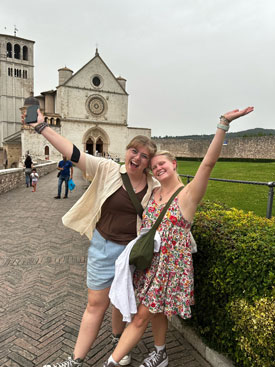

Abby Conklin, along a row of columns in the ancient city of Pompeii, Italy, during her summer internship.


Abby Conklin, along a row of columns in the ancient city of Pompeii, Italy, during her summer internship.
SUNY Fredonia enabled a Music Education major to combine long held passions for both music and history into a unique study abroad experience in Italy.
Through a 6-credit internship this past summer, Ms. Conklin, who’s also majoring in History, worked in an archaeological excavation amid ancient Roman ruins through the Umbra Institute, a higher education institution that’s focused on study abroad programs for college students.
“I have always been interested in archaeology and music is my major first, but I’ve always loved history, since age 10, and always loved archaeology,” Conklin, of Goshen, NY, explained.
“I knew, going into college as a senior in high school, I wanted to study abroad at some point,” she said, but that’s not a likely scenario for students pursuing a major in Music Education to spend a lot of time in Europe. Pursuing a B.A. in History, though, opened that door for Conklin.
Unlike many other schools, SUNY Fredonia and its School of Music allow Music Education students to also declare a major in an unrelated discipline. That was a key reason Conklin enrolled at SUNY Fredonia.
Abby's study abroad experience exposed her to the history of the ancient past, while at the same time required her to learn new skills like documenting, cataloguing, and archiving historical artifacts. – Dr. David Kinkela.
“I was always interested in Roman history since I was a child, and this seemed like the perfect opportunity learn about it in a very hands-on way, which was exactly what it was.”
Conklin attended the summer Archaeology Field School that was based near Castiglione del Lago on the shores of Lake Trasimeno, in the province of Perugia of Umbria, in central Italy. There, she engaged in all aspects of archaeological research.
“I learned how to extricate, how to identify types of soils and textures, how to identify artifacts,” she said. “We found a lot of animal remains: bones, boar tusks [along with] different forms of pottery – sigillata [a kind of pottery] that’s reddish/burgundy in color, with a very smooth texture.”

She also toured several historical attractions in the region, visiting the remains of the preserved ancient city of Pompeii, the Colosseum, aqueducts and the Roman Forum.
“Abby's study abroad experience exposed her to the history of the ancient past, while at the same time required her to learn new skills like documenting, cataloguing and archiving historical artifacts,” said Department of History Professor David Kinkela.
“The collaborative nature of her course work also supported Abby's learning in important ways. Not to mention that living and studying in Italy for six weeks provided opportunities for travel, discovering new foods, and learning about Italian culture,” Dr. Kinkela added.
Open-mindedness and communication were two key takeaways from the experience for Conklin.
“Being an effective communicator is crucial for any kind of teamwork in any field,” she said. To be curious and to ask questions are also important – even more so when you’re having new experiences and learning about other cultures that are vastly different from what’s in the United States, she added.
“It’s a little bit of a culture shock,” remarked Conklin, who’s only traveled outside of the U.S. twice, both times to Canada, “but in a good way.”
Conklin found the study abroad experience solidified her fondness of history to the extent that she’s contemplating graduate school.
“I love music and music education and also love history; I can’t see my life without those two things,” Conklin explained. “I’ll continue in education at the doctorate or Ph.D. level at some point in my life, because I love learning, and as an educator you’re a lifelong learner.” Her immediate career goal is to become a full-time music educator while also continuing to study history, perhaps working in archival studies at a museum.
In the meantime, Conklin is immersed in a final semester on campus before embarking on her student teaching experience in Orange County, NY, where her hometown is located, during the Spring 2025 semester.